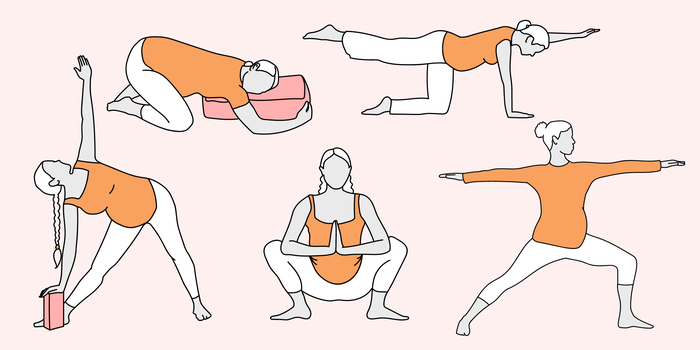
In 2012, a New York Times article suggested that yoga can cause back problems and even death. This article was based upon cherry-picked anecdotes and many of them were exaggerated. These stories did not represent the whole yoga experience. Scientists have confirmed that yoga is generally safe. For beginners, here are some tips.
Yoga is an exercise form that can provide many health benefits. If you are suffering from an injury, it is best to stop practicing yoga immediately. It can lead to other complications such as hemorhoids and can cause pain. In these cases, you should seek medical attention and consult a yoga instructor. A qualified instructor should be able to help you if you have hip pain.

Improperly performing yoga poses could lead to serious health problems. If you are recovering from a knee operation, it is advisable to consult your doctor before you begin a yoga program. Although the poses can sometimes be modified to reduce these risks, it is still a good idea to consult your doctor before you attempt them. It is important that you note that yoga may not be suitable for those with heart and lung problems. Heartburn is the most common side effect of excessive yoga, as with all exercise.
Yoga can cause serious injuries to people with certain health conditions. Some poses like Paschimottanasanasanasana (Padmasana) can be dangerous. If you're suffering from knee or disc pain, don't try yoga for these situations. You could end up injuring or hurting your self. This can be avoided by practicing safely and frequently.
Although yoga has many benefits, not all are worth the effort. Some poses can cause damage to your knees but are usually safe for most people. You should adjust your ability to perform the poses to fit your current level of fitness and health. Do not place too much stress upon your knees if arthritis is a concern. These exercises should be avoided if you are pregnant or have high bloodpressure.

Although yoga is a great way to relieve stress and improve your health, it can also be dangerous for some people. Yoga can lead to serious injury, and not just stress relief. Intensive forms of yoga include standing on your head or stretching your legs. These may cause injury. Yoga can be safe for most people and improve your quality-of-life. Although it's good for your health, some people find it dangerous.
FAQ
What are the 5 ways to improve wellbeing?
A person's well-being can be defined as their "state of mental, physical, spiritual, or social well-being". There are many factors that affect our well being, including work, family, health, relationships and finances. Your first step towards improving your health and well-being is to identify what areas of your daily life are lacking. Then, you can work to make these changes.
Here are five easy ways to improve your wellbeing
-
Exercise - It boosts endorphins, which can make us happier.
-
Sleep – A longer sleep time reduces stress and anxiety.
-
Nutrition – Healthy foods such as fruits & vegetables can boost your mood.
-
Meditation – Regular meditation reduces anxiety and stress.
-
Socialization - Spending quality time with friends and family makes us happy.
What are the five best ways to improve mental and emotional well-being?
-
Exercise – This is a great way to improve brain function and increase energy levels.
-
Sleep – A lot of sleep is good for stress and anxiety.
-
Nutrition - Healthy eating such as fruits, vegetables and meats will keep you healthy and energized.
-
Meditation - Meditation reduces anxiety and stress.
-
Socialization - Spending time in the company of friends and family keeps us happy.
How does one know if he/she has a mental illness?
When symptoms interfere with daily life, a person can be diagnosed with a psychological illness. Different symptoms can indicate mental illness. The most common symptoms are feeling depressed, sad, anxious, guilty and hopeless, lonely or depressed, as well as guilt, shame, guilt, guilty, guilty, guilty, suicidal and worthless.
A person may also be diagnosed with a mental disorder if they meet at least three out of four criteria listed below:
-
Disturbed feelings or thoughts
-
Unruly behavior
-
Disturbance to functioning
-
Reduced ability to relate to others
What can you do to improve your mental health?
Everyone needs mental health, especially when we feel stressed at work, school, home, or family. Exercise regularly, eat healthy meals, get enough sleep, and spend time with loved one are all ways to improve mental health. Exercise can increase endorphins, which make us happier. A healthy diet is important for our bodies to function properly. A good night's sleep will give you energy throughout the day. Finally, quality time spent with loved ones enhances our relationships as well as reduces stress.
Statistics
- Similarly, for positive mental health, there is likely to be substantial agreement about some typical components (e.g., resilience to stress) 6, and controversy about more atypical components (e.g., career consolidation). (ncbi.nlm.nih.gov)
- It means no drinking any alcoholic beverages and no taking any drugs that aren't 100% natural.
- Appropriate nutrition and exercise are likely among the most efficacious and cost-effective positive mental health interventions. (ncbi.nlm.nih.gov)
- In any given year, an estimated 18.1% (43.6 million) of U.S. adults ages 18 years or older suffered from any mental illness, and 4.2% (9.8 million) (healthypeople.gov)
- More than 50% will be diagnosed with a mental illness or disorder at some point in their lifetime.3 (cdc.gov)
External Links
How To
How to handle stress
Stress is normal. We need to learn how to relieve stress. Stress can affect all aspects of your lives. Stress can lead to physical problems like headaches, neck pain and back pain, as well as stomach aches, constipation. You may even develop ulcers if you're under chronic stress.
There are many things you can do to reduce stress. Exercise increases endorphin release, which can make you happy and relaxed. Meditation reduces stress by slowing down and deepening your breathing. Yoga is another excellent way to lower stress levels and improve overall health.
Stress management is best done by learning how to control it and then eliminating it entirely. Ask someone who is experienced to help you.